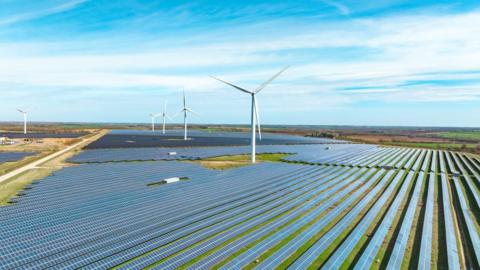In 2019, when the target to reach net zero carbon emissions by 2050 was set, public concern about climate change was very visible.
Thousands of people had joined Extinction Rebellion marches and the then-teenage activist Greta Thunberg was so influential she was invited to address MPs in Parliament.
Luke Tryl, pollster for More in Common, says he has not found a significant drop in concern about climate change or support for net zero, even if we're not seeing people on the streets.
What has changed, he says, is the conversation around it which, after the rising cost of living and the war in Ukraine, has switched to "how does this reflect on people's pockets and does it make people think the country is safer as a result?"
He also says the debate has become "more polarised between left and right" with Labour and Lib Dem voters seeing it as a "top three" issue, while Reform voters are more opposed to net zero but less motivated by it: only one in 10 people vote Nigel Farage's party because of net zero, Tryl's research suggests.
He also says that politicians are more divided than everyone else.
"The fracturing of the consensus has been far more profound at what we'd call 'elite level' rather than at public level," he says.
Undoubtedly, part of the rise in the conversation about climate targets has been driven by the rise of Reform, which has made what it calls "net stupid zero" one of its major campaign issues.
Deputy leader Richard Tice says his party - which has just won a by-election and made major gains in local elections - has forced the issue onto the political agenda.
"On the doors, people are talking about immigration but the next thing they talk about is the price of everything, the bills, the cost of living. When you drill into it, the message is getting across that the increase in the cost of living is significantly due to the increase in energy costs.
"The awareness of the stupidity of this has transformed in the last six months, because of the destruction of jobs and bills. People are waking up all over the place."
For the Green Party of England and Wales Co-Leader, Adrian Ramsay, the fracturing of consensus is "distressing" and he blames party politics.
"There are parts of the political spectrum that are determined to turn this into a political football but I think reasonable people within all parties need to resist."
He says people do need to feel they are included in climate measures and believes there is a "sensible climate majority" within Parliament, whose job it is to make the right policies to bring people along with them.
"Of course it has to be done in a way that brings people with us and there is a risk that there's too much onus put on individuals so when it comes to things like public transport, for instance....the greener option needs to be the cheaper option."
